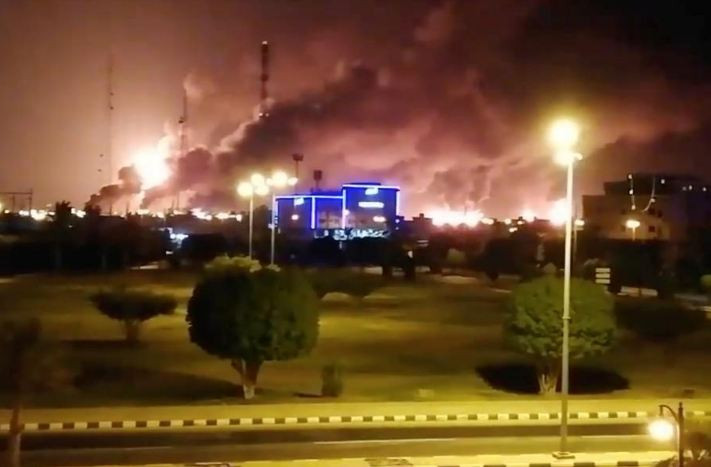Saudi Arabia is all but accusing Iran of launching the devastating aerial drone attacks Saturday that heavily damaged two of its most important oil installations but will make a public condemnation only after it determines where the drones were launched from.
Yemeni Houthis, who are backed by Iran, claimed responsibility for the drone attacks at Abqaiq and Khurais. The successful surprise attacks forced the temporary shutdown of both vital facilities, effectively reducing Saudi Arabia's total oil production by 50 percent, said the Ministry of Energy.
Videos of the aftermath of the attack on Abqaiq, Saudi Arabia's main oil production facility, show massive fires sparked by the aerial onslaught. The extensive damage was later confirmed by satellite photos released to the public.
Abqaiq is located 205 miles northeast of Riyadh and is the world's largest oil processing facility and crude oil stabilization plant. It has a processing capacity of more than 7 million barrels per day (bpd). On the other hand, Khurais is the second-largest oil field of Saudi Arabia with a production capacity of 1.5 million bpd.
Both installations are owned and operated by Saudi Aramco or the Saudi Arabian Oil Company.
The Arab Coalition, the Saudi-led armed force currently fighting to destroy the Houthi government in Yemen, on Monday said it's still investigating the drone strikes and is still trying to ascertain the launch location of the drones.
Coalition spokesman Colonel Turki al-Malki said the Arab Coalition will eventually reveal the location from where the drones were launched at a press briefing within the week. This missing piece of the puzzle will allow the Arab Coalition to definitely say which country -- Iran or Iraq -- was behind the attack.
This early, however, al-Malki is pointing the finger of blame at Iran based on evidence at hand.
"The preliminary results show that the weapons are Iranian and we are currently working to determine the location ... The terrorist attack did not originate from Yemen as the Houthi militia claimed," said al-Malki at a press conference in Riyadh.
He said the coalition will reveal the location from where drones were launched at a future press briefing. Al-Malki reaffirmed Saudi Arabia is capable of protecting its vital energy and economic sites.
"This cowardly act largely targets the global economy and not Saudi Arabia," he said.
His statements were later backed-up by the Saudi Arabian government. The Ministry of Foreign Affairs said initial investigations show Iranian weapons were used in the attack and investigations are ongoing to determine the source of the attack.
The ministry also thanked the international community for condemning and denouncing the drone attack and invited the UN and international experts to participate in the investigation.
Saudi Arabia has a sophisticated and multi-billion dollar air defense network, mostly supplied by the United States, which failed to thwart the drone attack. Military analysts said this system isn't configured to take down aerial drones but is effective against other higher-value targets such as high-speed jets and missiles.
The Saudis lack of defense against an asymmetric attack such as Saturday's drone strikes only drove home this point.
"The Kingdom affirms that it has the capability and resolve to defend its land and people, and to forcefully respond to these aggressions," said the Ministry of Foreign Affairs in a statement.
The Iranian-backed Yemeni Houthis have increased the tempo of their drone and missile attacks on Saudi cities this year.
The Saudi-led intervention in Yemen was launched in 2015. Saudi Arabia led a coalition of nine countries from the Middle East and Africa to reinstall the ousted government of president of Yemen Abdrabbuh Mansur Hadi, a Saudi ally. The ongoing war in Yemen is a proxy war between Saudi Arabia and Iran.






